What’s the best food preservation and storage method? Canning, freezing, dehydrating, or fermenting? Here are ideas on how to store food, plus the pros and cons of each method, so you can make the best decision for your family!
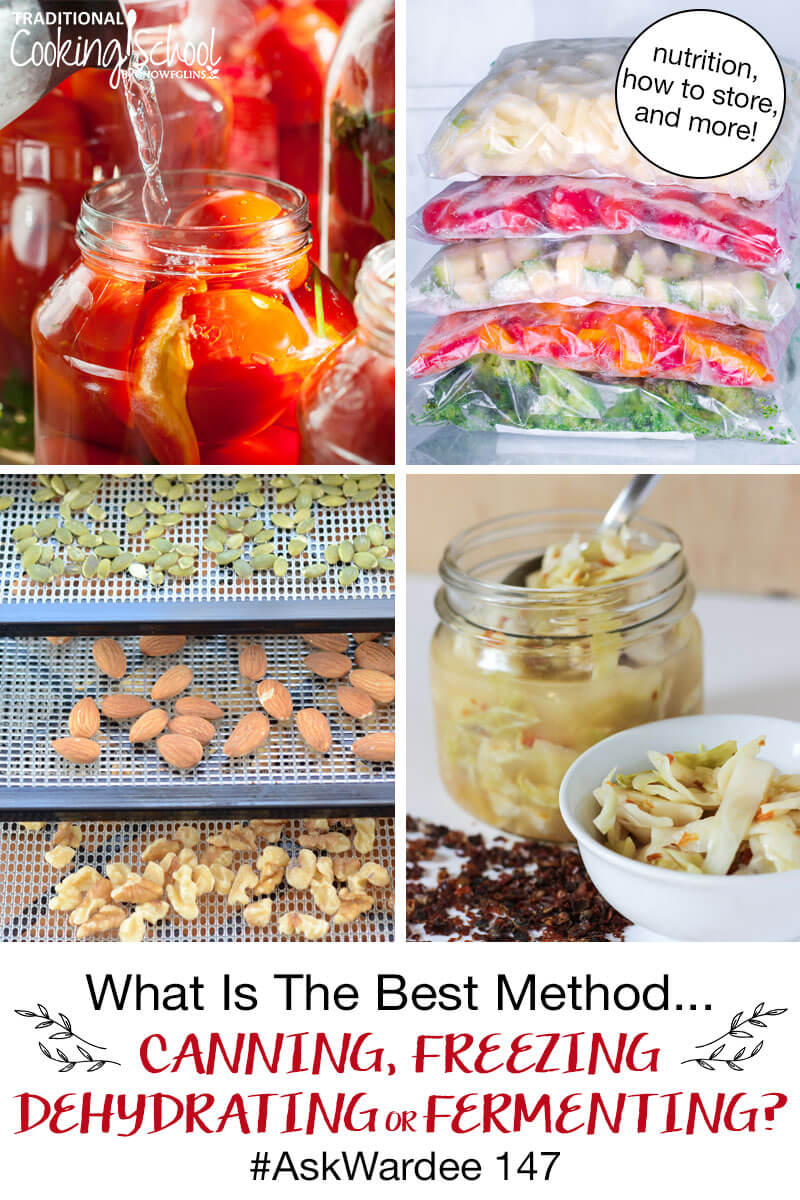
Canning, freezing, dehydrating, or fermenting… which is the best? Which is healthiest?
Want to preserve food but not sure which method is best for your family, your space, your health goals, and your life?
To help you choose what’s best for you and your family, I’m covering the nutrition, storage needs, and other considerations on today’s #AskWardee!
Keep reading or watching below to learn more!
Subscribe to #AskWardee on iTunes, Stitcher, YouTube, or the Podcasts app.
Table Of Contents
The Question: How To Improve Nutrition Of Canning?
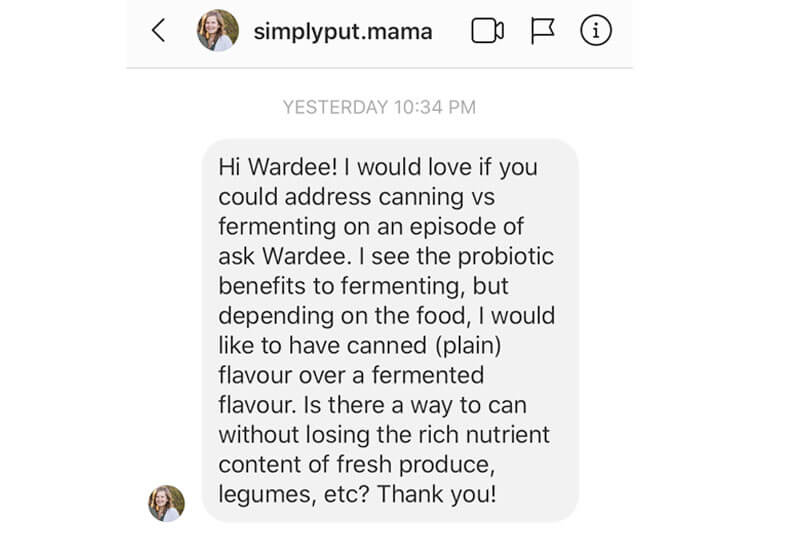
Kendra (@simplyput.mama on Instagram) asked me (@TradCookSchool on Instagram):
Hi Wardee! I would love if you could address canning vs fermenting on an episode of #AskWardee. I see the probiotic benefits to fermenting, but depending on the food, I would like to have canned (plain) flavor over a fermented flavor. Is there a way to can without losing the rich nutrient content of fresh produce, legumes, etc.? Thank you! —Kendra, @simplyput.mama on IG
Kendra, thank you for your question!
Because we’re featuring your question today’s #AskWardee, you’re getting a gift — a FREE eBook and Video Package! Our team will be in contact with you so you can choose which one you’d like!
The “Best” Food Preservation Method
The “best” or “right” food preservation method varies depending on storage capabilities and, of course, personal preference.
I can’t possibly cover every nuance, so I’m going to outline the nutrition and storage aspects for both canning and fermenting (and also freezing and dehydrating!), as well as extra considerations you might keep in mind when choosing a food preservation strategy for your home and family!
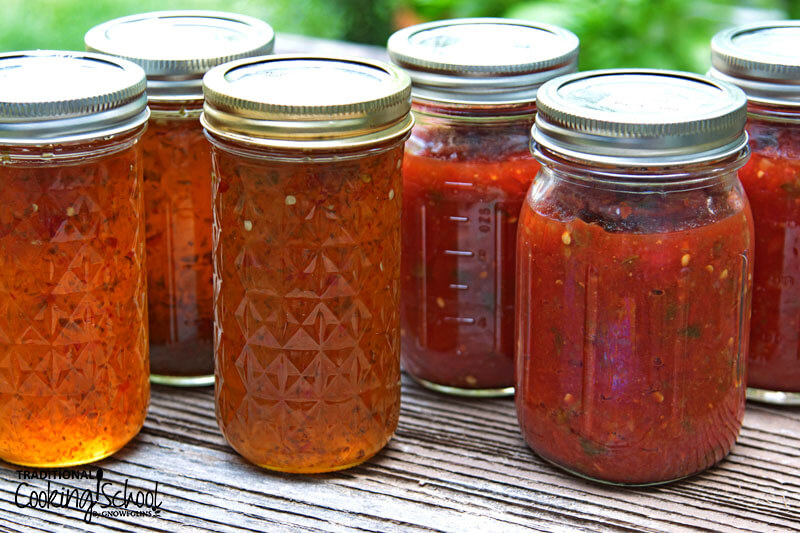
Canning
The most well known preservation method in today’s world…
Nutrition Of Canning
Unfortunately, due to high heat and/or high pressure, the nutrition from vitamins and enzymes are lost during canning.
Storage Needs Of Canning
Because canned food can be kept at room temperature without fear of spoiling, you need only the space for it: shelves, pantry, even little corners throughout your house!
Extra Considerations Of Canning
The nutrient loss I mentioned earlier is not necessarily an issue with foods that you’re going to eat cooked anyway. This is why I’ve often canned tomato sauce, canned green beans and other beans, and canned meat!
When you’re canning, you’re boiling water for hours on end, which can really heat up an already hot house in the high heat of summer. Consider creating an outdoor kitchen for canning, or hopefully you have air conditioning!
Canning takes more time and expertise to produce safely canned home foods. Although we have some canning recipes and methods (right here), I don’t consider myself a canning expert.
If you’re interested in diving deeper into canning, I’ll refer you to the excellent (and safe!) resources of my online colleagues:
- Melissa K. Norris’ Home Canning with Confidence eCourse
- Sharon Peterson’s Simply Canning eBook (as well as other online resources)
Finally, to can you need glass canning jars as well as the lids and bands. The jars are heavy and breakable, which are not ideal if portability is needed.
Here’s our archive of canning posts!
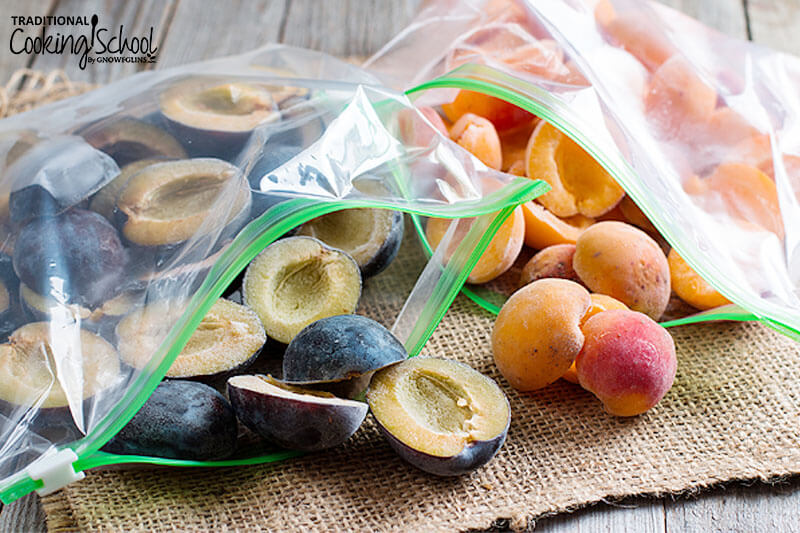
Freezing
Just pop the excess in the freezer, that’s literally how easy freezing can be!
Nutrition Of Freezing
With freezing, you’re essentially maintaining the current nutrients such as vitamins and enzymes in the food. However, they will degrade over time in the freezer.
Storage Needs Of Freezing
If you intend for freezing to be a large part of your food preservation strategy, you’ll need an extra freezer or freezers. Especially if you’re planning to pop whole tomatoes, peppers, or eggplants in the freezer (which many people do!).
Extra Considerations Of Freezing
It’s best to triple bag your food when freezing, as well as squeeze out as much air as possible. This will delay freezer burn as long as possible.
Freezer burn not only degrades nutrition, but affects the flavor of food.
in post photo of jars (I will take)
You can freeze food in glass jars, but know that they are susceptible to breaking. Especially regular or wide mouth Mason jars that have a curve in the shoulder, which is the weak spot when frozen. Special freezer jars that have straight sides will fare better.
If you do freeze in Mason jars with shoulders, keep the food well below the level of the shoulder, allowing for it expand in the freezer and still not come up to the shoulder of the jar.
Finally, some foods like cucumbers, sour cream, and cooked rice don’t freeze well. However, many foods do, and I especially like to freeze fruit (berries!), cheese, butter, tomato sauce, dough, already cooked breads, and jam.
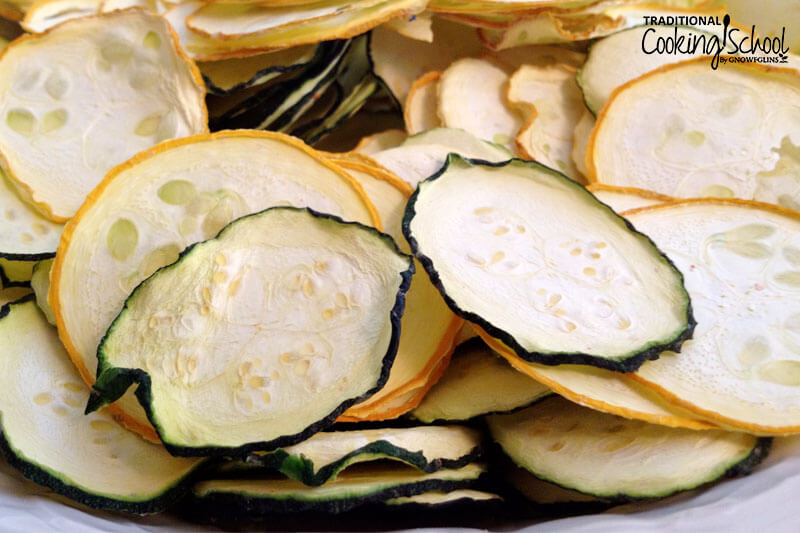
Dehydrating
Dehydrating is one of the oldest preservation methods, and certainly one that a lot of us have taught our kids (sliced dried bananas, anyone?)… it’s worth including here, too!
Nutrition Of Dehydrating
With dehydrating, you’re essentially maintaining the current nutrients such as vitamins and enzymes in the food. However, they can degrade over time, especially if not stored in ideal conditions.
Storage Needs Of Dehydrating
The shelf life of dried foods varies widely, with some foods (such as jerky) lasting weeks or less, and others (such as dried beans or dried grains) lasting 10 to 15 years or more.
For best results, store dried foods in dark, cool, dry, and critter-free environments. With regard to temperature, it’s best to have constant cool temperatures rather than fluctuating temperatures.
Even though dried foods are much lighter and smaller than fresh (due to the water content being removed), you still need room for them! This means shelves, pantry, bins, and/or buckets with dessicants (those packets that absorb moisture so your food doesn’t).
You can get into more advanced dried food storage methods involving vacuum sealing. We cover this in-depth in our Dehydrating eBook/eCourse.
Extra Considerations Of Dehydrating
In general, meats can’t be stored long term unless low fat and heavily salted, and even then benefit from cold storage.
Some foods’ texture isn’t as desirable when dried then rehydrated. Examples would be vegetables such as cucumbers or bell peppers.
Having said that, many foods are amazing when dried… like fruit leather!
If you really want to get into dehydrating, you’ll need a dehydrator so you can do large batches and maximize your efficiency. I recommend the Excalibur 9-Tray Cube Dehydrator. For more information on this topic, you can also refer to How To Choose The Best Food Dehydrator.
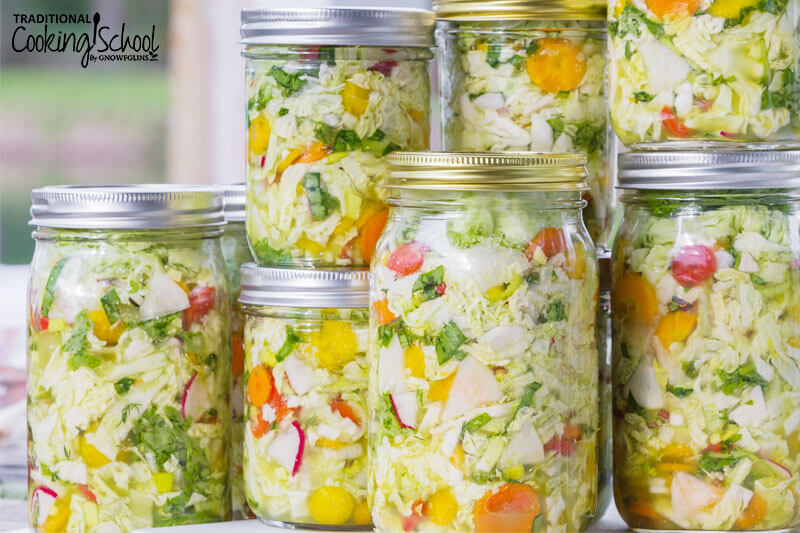
Fermenting
Although we most often discuss lacto-fermentation that creates foods such as sauerkraut or pickles, this category also includes turning dairy into cheese, or creating homemade vinegars or alcohols. Besides dehydrating, this is the world’s oldest (and healthiest) food preservation method!
Below, I’m specifically referring to lacto-fermentation, but please note that much (but not all) of this applies to other types of ferments as well.
Nutrition Of Fermenting
The healthiest food preservation method, fermenting increases nutrition with a proliferation of probiotics, as well as more enzymes, vitamins, and beneficial acids. The beneficial acids are good for the gut as well as acting as a preserving acid.
Storage Needs Of Fermenting
Even though you ferment your foods at room temperature, once done, your ferments such as sauerkraut or pickles, must be transferred to cold storage such as a refrigerator or cool cellar. Room temperature storage is not an option.
Extra Considerations Of Fermenting
Even though ferments are healthy, still some family members might not care for the sour taste. I believe this can be overcome in time, however it’s still a concern.
And although this is one of the easiest preservation methods (pack into a jar with salt and let it sit!)… hot summer temperatures over 80 degrees Fahrenheit can make it more challenging to get a good result. (More info on fermenting temperatures in this #AskWardee 144: How To Keep Ferments Warm.)
For safe, tried and true easy recipes and methods, check out our extensive archives of ferment recipes here or our Lacto-Fermentation eBook or eCourse.
The Bottom Line
When you’re choosing an ideal food preservation method (or methods) for your family, at least two factors are HUGE…
First, your storage capabilities. For instance, if you don’t have an extra fridge or freezer, freezing or fermenting might not be possible (at least on a large scale). Right off the bat, your space and appliances limit your options.
Second, your family’s tastes. If your family dislikes fermented foods or the texture of dry foods and won’t eat them, then it would be wasteful to preserve food that way. For health or religious purposes, some question the alcohol content in ferments. For more information, refer to Do Lacto-Ferments Contain Alcohol? #AskWardee 127.
No matter what method you’re choosing (even canning), it is tastier, healthier, and cheaper than relying on the grocery store, especially if purchasing in quantity or out of season.
Above all, make the best choice for you and your family!
More Fermenting Info, Reviews, and Recipes…
Check out my Lacto-Fermentation 101 Free Video Series RIGHT HERE.
And if you haven’t already, CLICK HERE to download our FREE “Fermenting Formulas” Cheat Sheet, where I share formulas so you can create your own safe ferments using the product you have on hand — salsas, relishes, krauts, beverages, and more!
We also have extensive archives of ferment recipes here!
Any Questions Or Comments?
If you have other questions or comments about your own experience with food preservation methods, be sure to leave them in the comments!
Helpful Links
- FREE “Fermenting Formulas” Cheat Sheet
- ‘canning’ recipes and posts at Traditional Cooking School
- Melissa K. Norris’ Home Canning with Confidence eCourse
- Sharon Peterson’s Simply Canning eBook (as well as other online resources)
- Dehydrating eBook/eCourse
- Excalibur 9-Tray Cube Dehydrator
- #AskWardee 144: How To Keep Ferments Warm
- extensive archives of ferment recipes here
- Lacto-Fermentation eBook or eCourse
- Lacto-Fermentation 101 Free Video Series RIGHT HERE
- Cultured Dairy eBook/eCourse
Share your family’s favorite methods of food preservation in the comments!
We only recommend products and services we wholeheartedly endorse. This post may contain special links through which we earn a small commission if you make a purchase (though your price is the same).


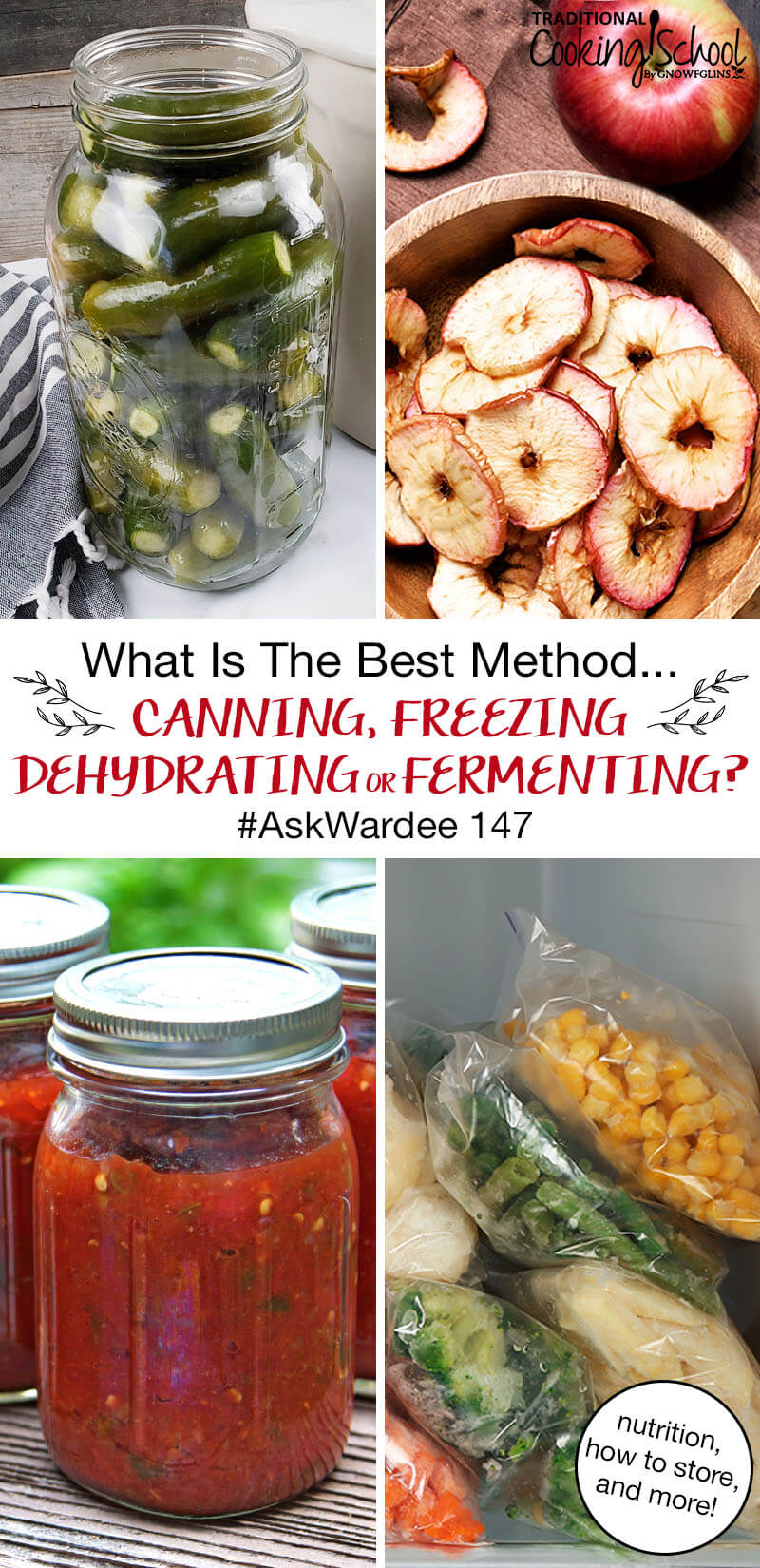
Have you ever soaked fresh eggs in hydrated lyme liquid to store them?
Hi, Susan.
No, we have not. 🙂
~Danielle, TCS Customer Success Team
What about freeze drying food?
Sorry Mary, we don’t have any experience with freeze drying but you certainly could freeze dry foods.
~ Vicki, TCS Customer Success Team